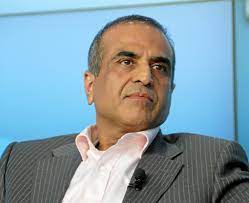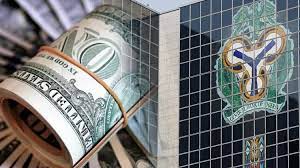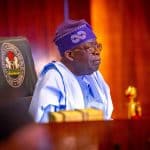Chairman of Bharti Airtel Limited, Sunil Bharti Mittal, has applauded the foreign exchange reforms of Nigeria’s President Bola Tinubu.
Mittal, who spoke after his meeting with President Tinubu at the Presidential Villa, Abuja on Monday, said the decision to float the naira, thereby allowing market forces to determine the exchange rate, is a good one, especially for investors.
Join our WhatsApp ChannelThe Chairman of Bharti Airtel Worldwide said that the lack of easy access to forex has remained a difficult challenge for investors over the years.

He said that under the former system set by the Central Bank of Nigeria (CBN), they found it difficult to navigate the forex market to conduct their businesses in the country.
READ ALSO: Naira Float: 40% Of Nigerian Banks May Raise New Equity Capital
“One of the biggest problems for foreign investors in this country for many, many years has been of lack of easy and available foreign exchange. We as foreign investors who have spent billions of dollars here do not mind paying whatever the market rate is, as far as the market must decide, but to be prevented from importing some critical infrastructure was making things extremely difficult for a company like Airtel and other industries like ours as well.
“One of the key changes that His Excellency the President has made, in the first few days of his tenure has been making naira free float unto the market, making the market decide, as opposed to the CBN’s structure of exchange rate which was very difficult to navigate for a company like ourselves and many other MNCs,” Mittal stated.
He observed that the Naira has been devalued but the markets have given a standing ovation to the recent move to address the challenges in foreign exchange.
He also expressed optimism that with the reforms, investors who will be coming into the Nigerian market will be full of excitement.
“As you can see, the naira has been devalued but the worldwide market has given a standing ovation to this move and the dollar bond has strengthened here in Nigeria and generally giving excitement to the investing companies who will be coming to put their business here in Nigeria.”
Mittal said he has seen President Tinubu’s commitment to reducing poverty, adding that his country, India, had similar experience years back but has rapidly reduced it with massive investment in infrastructure, digital ecosystem creation, and the deployment of the digital infrastructure to provide services to the people and creating jobs.
He also said the company is committed to making more significant investments in Nigeria, in the telecom sector with the rollout of the 5G services, putting up more data centres, and more importantly, supporting the flourishing technology startup ecosystem in the country.
He further highlighted the upcoming G20 Summit in India, where he was appointed the Chairman, Africa’s Integration Council, and will discuss about Airtel India and Nigeria, while also presenting recommendations to enhance trade between African countries using local currencies.
“This will enable the African continent and the AFCTA to trade between themselves in a more powerful way and perhaps local currencies, ensuring the advantages of trading within the continent are better, making sure the continent flourishes with its growing population as fast as they can.”
Also commenting on the ongoing forex reforms in the country, Airtel Africa said it welcomed the changes, adding that they are a positive move toward a more stable foreign exchange market.
In a statement signed by Simon O’Hara, the Group Company Secretary, it said that a recent currency-devaluation sensitivity analysis highlighted that a 1% devaluation in the naira would have a negative impact on revenue of $22 million and of $12 million on earnings before interest, taxes, depreciation and amortization (EBITDA).
It added that the dollar component of operating costs within the Nigerian system was minimal and as such it didn’t anticipate a material effect on EBITDA margin.
“The market expectation is that the new foreign currency policy and subsequent realignment of the several market exchange rates will provide greater U.S. dollar liquidity and help to alleviate the challenges faced in the last few years to access U.S. dollars in the market,” the company said.
READ ALSO: Naira Devaluation To Cause Negative Impact Of $22m On Revenues, Airtel Africa Tells Shareholders
Commenting on the forex reform, CEO of Financial Derivatives Company, Bismarck Rewane, said the first indication that the policy is working in terms of strengthening the naira, is that for the first time in 15 years, Naira as of Monday, 19 June, was better at the official market than in the parallel market as it closed at N770 in the official market (Importers & Exporters window), while it traded at N757 in the parallel market.
Mr Rewane, who spoke in an interview with Channels Television Business Morning, programme on Tuesday, noted that another indication that the reform is a right step in the right direction is the lifting of restrictions on amounts deposited into domiciliary accounts, which allowed people to deposit money into their accounts and take it out, created an initial reaction of naira appreciation because of the perception that there will be supply.
He added that the unification of the exchange windows would begin to make commodities cheaper as the county is still imported-dependent. “What will happen is that the true commodity price for example, the price of wheat has increased, and then you will see the price of wheat in the Nigerian market increase. The price of gas has reduced in Ukraine, you will see the price of gas in Nigeria begin to decline. So, Nigeria will become part of the universal and global market and that is good for investors and that is good for the market. That is the reality,” the financial expert stated.
Victor Ezeja is a passionate journalist with seven years of experience writing on economy, politics and energy. He holds a Master's degree in Mass Communication.

















Follow Us